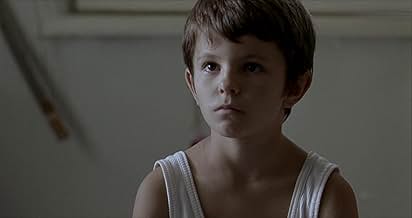Como Festejei o Fim do Mundo
Título original: Cum mi-am petrecut sfârsitul lumii
AVALIAÇÃO DA IMDb
7,1/10
3,3 mil
SUA AVALIAÇÃO
Adicionar um enredo no seu idiomaIn Communist-era Romania, people live with hope for a new life of freedom.In Communist-era Romania, people live with hope for a new life of freedom.In Communist-era Romania, people live with hope for a new life of freedom.
- Prêmios
- 7 vitórias e 7 indicações no total
- Direção
- Roteiristas
- Elenco e equipe completos
- Produção, bilheteria e muito mais no IMDbPro
Enredo
Você sabia?
- CuriosidadesRomania's official submission to the 79th Academy Awards (2007) for Best Foreign Language Film.
- Erros de gravaçãoThere is a longer scene in the movie showing a bus trying to turn around on muddy soil. The bus is a Rocar bus, which has been produced only after 1990, and it has stickers on its doors, which surely have not been used before 1989.
- Trilhas sonorasMarsul de Intampinace
Written by anonymous
Copyright 2006 by Strada Films & Les Films Pelléas
Avaliação em destaque
I've been trying to watch all Romanian films of late, although without much success. Some are just too ludicrous and others simply can't arouse any interest on my behalf.
I'd seen Trafic from Mitulescu, a slice of life piece from the busy happenings of Bucharest, which was a celebrated achievement of Romanian cinema at that time - with some merit. Now, "Cum mi-am petrecut sfarsitul lumii" is, firstly, a film with a striking title that can lead you on - erroneously. Going beyond the metaphor, I guess you can accept it as what the end of communism symbolized: the end of an era.
The film itself is about a young girl, Eva, (very well played by D. Petre) who is not only passing through the usual problems which come with adolescence, but who must also bear the weight of communism and its effects on her shoulders. I myself saw in her a prototype of the modern woman, the one who wants to think for herself and act as she deems is correct (but who also understands the importance of sacrificing herself at times), and all this burden of age and political restraints are fantastically mirrored on D. Petre's face. However, the film doesn't really go far beyond illustrating the last segment of the Ceausescu era - the fear, the hate, the desire to flee. While Eva's constant struggle, between responsibility (family) and rebellion, does deliver a certain dose of tension and dynamics, the film felt unsatisfying in the end.
What I'm referring to is that feeling you expect to encounter after a rather warm film about a different kind of childhood with a rather different sort of dreams: that overwhelming experience of fulfillment - both what the characters are concerned and the audience. So while "Cum mi-am petrecut sfarsitul lumii" has its good moments and conveys a very true perspective of those days, it simply did not satisfy me. Maybe it's the fact that I "missed out" on the era and, consequently, can't truly understand them. But what I felt was real enough for me, so the problem must lie within the story.
I'd seen Trafic from Mitulescu, a slice of life piece from the busy happenings of Bucharest, which was a celebrated achievement of Romanian cinema at that time - with some merit. Now, "Cum mi-am petrecut sfarsitul lumii" is, firstly, a film with a striking title that can lead you on - erroneously. Going beyond the metaphor, I guess you can accept it as what the end of communism symbolized: the end of an era.
The film itself is about a young girl, Eva, (very well played by D. Petre) who is not only passing through the usual problems which come with adolescence, but who must also bear the weight of communism and its effects on her shoulders. I myself saw in her a prototype of the modern woman, the one who wants to think for herself and act as she deems is correct (but who also understands the importance of sacrificing herself at times), and all this burden of age and political restraints are fantastically mirrored on D. Petre's face. However, the film doesn't really go far beyond illustrating the last segment of the Ceausescu era - the fear, the hate, the desire to flee. While Eva's constant struggle, between responsibility (family) and rebellion, does deliver a certain dose of tension and dynamics, the film felt unsatisfying in the end.
What I'm referring to is that feeling you expect to encounter after a rather warm film about a different kind of childhood with a rather different sort of dreams: that overwhelming experience of fulfillment - both what the characters are concerned and the audience. So while "Cum mi-am petrecut sfarsitul lumii" has its good moments and conveys a very true perspective of those days, it simply did not satisfy me. Maybe it's the fact that I "missed out" on the era and, consequently, can't truly understand them. But what I felt was real enough for me, so the problem must lie within the story.
- tributarystu
- 28 de set. de 2006
- Link permanente
Principais escolhas
Faça login para avaliar e ver a lista de recomendações personalizadas
- How long is How I Celebrated the End of the World?Fornecido pela Alexa
Detalhes
- Data de lançamento
- Países de origem
- Central de atendimento oficial
- Idioma
- Também conhecido como
- Como Eu Festejei o Fim do Mundo
- Locações de filme
- Empresas de produção
- Consulte mais créditos da empresa na IMDbPro
Bilheteria
- Orçamento
- € 1.500.000 (estimativa)
- Faturamento bruto mundial
- US$ 296.980
- Tempo de duração1 hora 46 minutos
- Cor
Contribua para esta página
Sugerir uma alteração ou adicionar conteúdo ausente

Principal brecha
By what name was Como Festejei o Fim do Mundo (2006) officially released in Canada in English?
Responda





















